OP Sequence
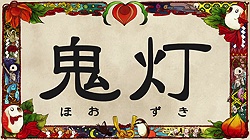 |
 |
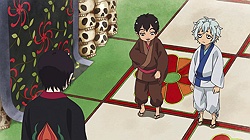 |
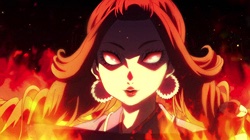 |
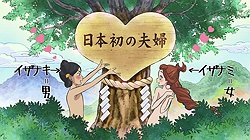 |
 |
OP: 「Dai! Jigoku Jigobushi」 by (Jigoku no Sata All Stars)
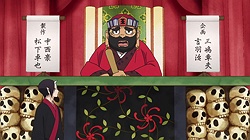 |
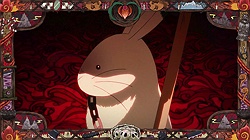 |
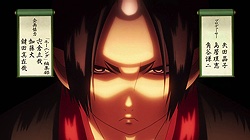 |
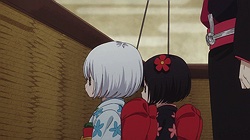 |
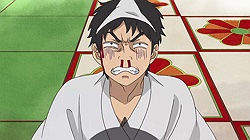 |
 |
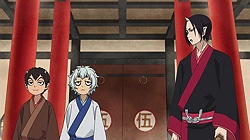 |
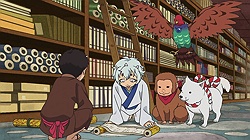 |
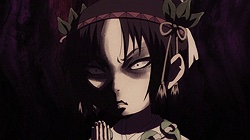 |
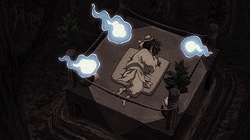 |
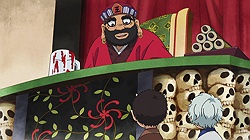 |
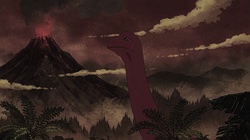 |
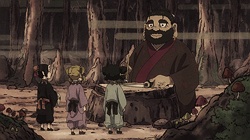 |
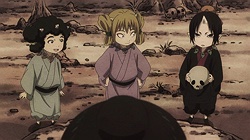 |
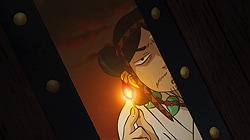 |
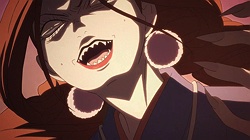 |
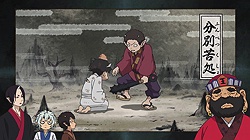 |
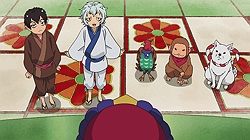 |
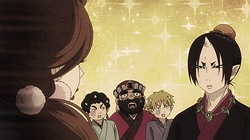 |
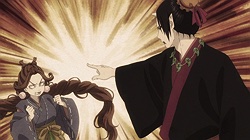 |
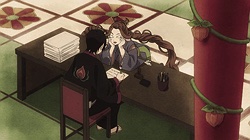 |
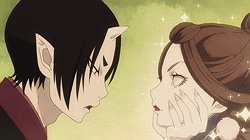 |
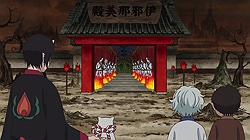 |
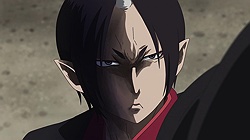 |
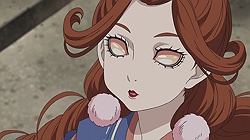 |
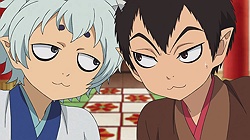 |
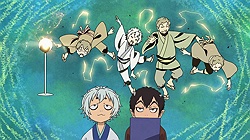 |
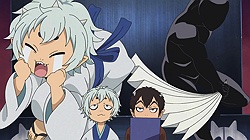 |
 |
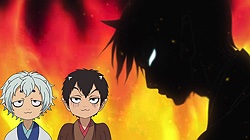 |
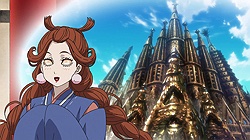 |
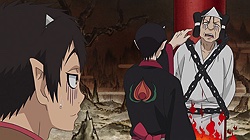 |
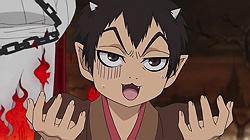 |
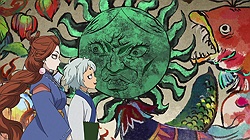 |
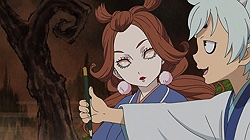 |
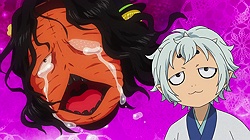 |
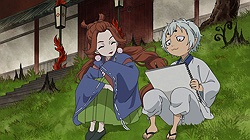 |
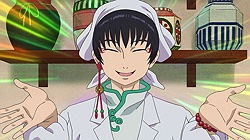 |
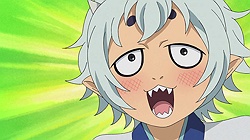 |
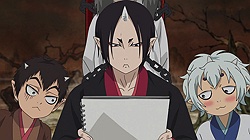 |
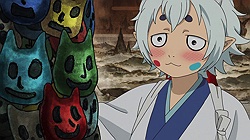 |
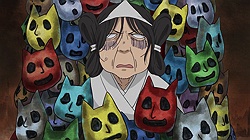 |
 |
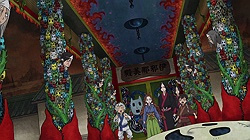 |
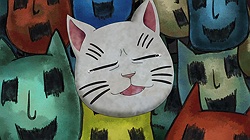 |
「神代あの世革命/恨みつらみあってこそ」 (TKamishiro anoyo kakumei/Uramitsurami atte koso)
“The Revolution of the Age of the Age/The Heart is a Grudge Against You”
It’s times like this where first weeks of anime seasons (even mediocre ones) get exhausting. More and more the interesting shows tend to get clustered on Friday and (especially) Saturday, and this Fall is no exception – four high-anticipation premieres dropped in a matter of just a few minutes. That means a certain brevity is required for my sanity’s sake, but I’ll always make time for Hoozuki no Reitetsu – it’s one of my favorite anime comedies of the past decade.
Hoozuki no Reitetsu is massively popular – not so much in the West, but in Japan it’s a powerhouse. The manga regularly sells 200K plus per volume, it’s a merchandising machine, and the first season of the anime was the biggest non-idol/Isin anime of 2014 on disc. It’s surprising how long it’s taken (three and a half years) to get a second season – especially considering that the most logical reason was that Wit was too swamped to produce it, and it ended up switching to Studio Deen anyway. We also have a new director, but when that director is a stalwart like Yoneda Kazuhiro (Akatsuki no Yona, Kabukibu!) – not only a great director but the man who helmed the second Hoozuki OVA – my level of concern over that is nil.
As to the studio switch, well- that was a mild concern perhaps, as the original series was one of the most gorgeous anime comedies of all-time. There may perhaps be just the smallest slippage evident in this premiere – the animation not quite as fluid, once or twice the background detail dropping – but on balance, you wouldn’t necessarily guess anything was different. The visual palette of Hoozuki no Reitetsu remains incredibly inventive, a riot of imagination and color melding traditional Buddhist art and modern pop culture motifs.
As to content, nothing at all has changed there and you wouldn’t expect it to – we’re working off manga material and the series composition is (as ever) handled by the excellent Gotou Midori. Hoozuki is a smart, smart comedy – a Python-esque blind of the high-concept and bawdy (as so many great comedies are). There’s no time spend on expansive re-introductions – we jump right into things with a look back at how Hoozuki-sama came to be (this is instigated, as so many good distractions here are, by Karauri and Nasubi). It’s a dark tale, as you’d expect – he was a human boy, sacrificed by superstitious villagers (deemed expendable because he was an orphan and outsider).
This setup is so, so fitting – because no one else could hold a grudge so viciously and yet seem so detached about it as Hoozuki. Indeed grudges are a big theme here, especially as we segue into the B-part of the episode, which focuses on Izanami-sama. She was the first Chief of Staff for Enma-ou, a fallen Goddess (there are echoes of the Orpheus and Eurydice tale in Izanami’s) herself largely driven by her revenge-lust against her former husband Izanagi. Eventually a desperate Enma-sama tapped Hoozuki (whose genius he’d spotted when the latter was a child, new to Yomi) as his new chief of staff, and Hoozuki manages to shoo Izanami off into retirement in a palace he builds for her (using the villagers who sacrificed him as pillars for the entryway).
Hoozuki no Reitetsu has an ultra-rich vein of supporting characters to draw on (a trait of most great anime comedies), but so many of the most amusing chapters seem to involve Karauri and (especially) Nasubi – especially when the little eggplant draws on his artistic side as he does in re-designing the palace’s entryway at Izanami’s request. Nasubi’s answer is his typical combination of inspired genius and childlike absurdity – and seems certain to cause great distress to both the villagers (who will soon be wishing they were back to being on fire) and Izanami-sama. Gaudi he’s not, but there is something of that great modernist’s sensibility in what Nasubi-kun does. It is genius in its singular, quirky fashion – and the same could certainly be said of Hoozuki no Reitetsu itself. It’s a modern classic, and it’s great to have it back.
ED Sequence
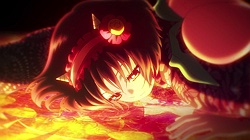 |
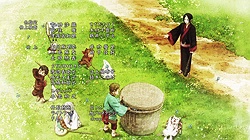 |
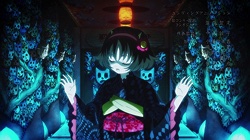 |
ED: 「リバーサイド・ラヴァーズ」 (Riverside Lovers) by (SUmire Uesaka)
Preview
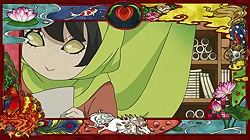 |
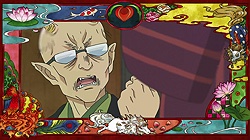 |
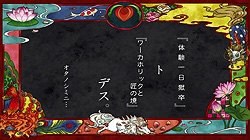 |

Hozuki’s Japanese-ness makes it both interesting and difficult for uninformed Western viewers to get into, especially the Japanese pop-culture/comedy references (Mythology is more easily Wiki’d or researched online).
I don’t disagree with that, certainly. But Osomatsu-san is at least as culturally-specific and that’s something of a crossover hit with gaijin fans.
It’s like an oxymoron to think that it’s sad for Hoozuki’s life and it’s happy for Hoozuki’s afterlife. Can’t wait to see the next episode.